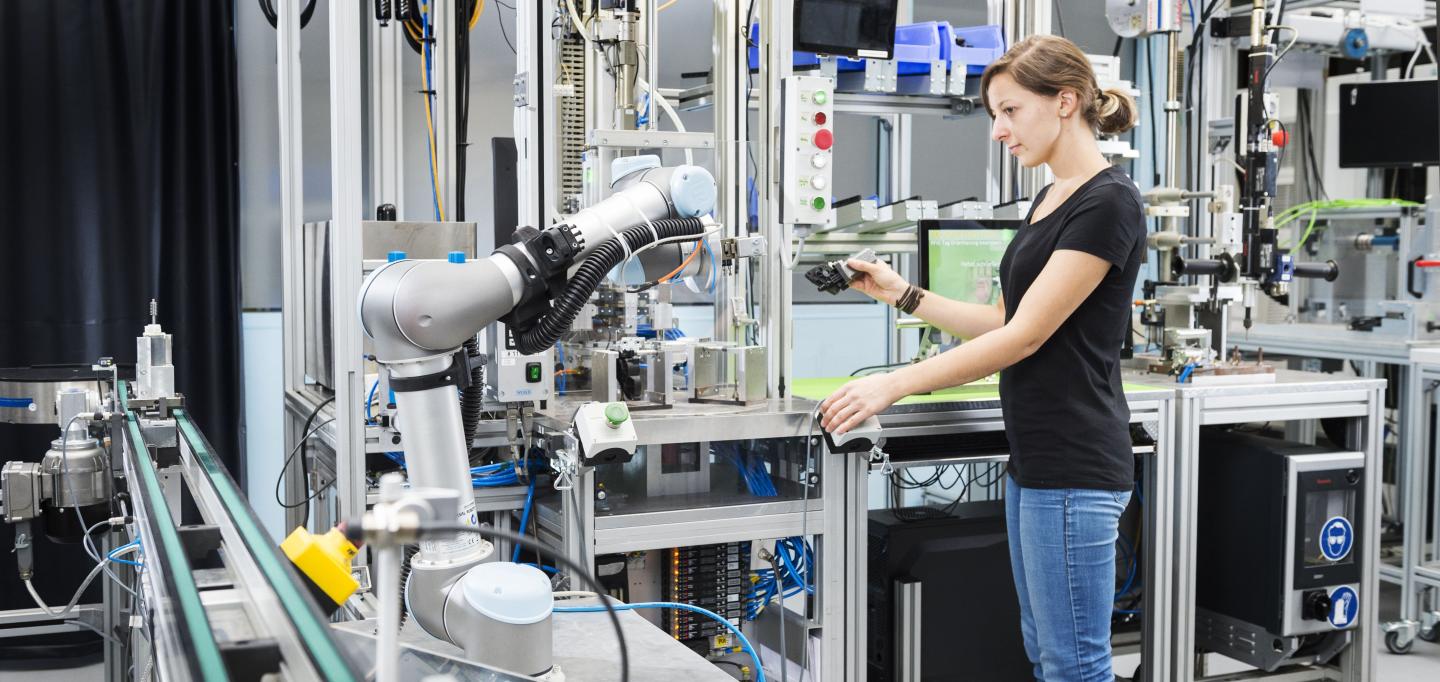AI makes industrial production viable — interdisciplinary research group develops agile manufacturing systems at KIT — funding of €3 million by Carl Zeiss Foundation

Credit: Photo: Sandra Goettisheim, KIT
Clients request customized solutions, product lifecycles become shorter, new business models result: Industrial production has to keep pace with these dynamic changes. At Karlsruhe Institute of Technology (KIT), an interdisciplinary group of researchers from mechanical engineering, electrical engineering, information technology, and computer science is now working on an agile production system that autonomously and dynamically adapts to changing product specifications in remanufacturing. This AgiProbot project is funded by the Carl Zeiss Foundation with EUR three million.
“Industrial production has to supply increasingly customized products and be highly efficient at the same time,” says Professor Gisela Lanza, spokesperson of the AgiProbot (German acronym for Agile production system based on mobile, learning robots with multi-sensor technology for uncertain product specifications) project. Conventional solutions for optimizing classical line production are reaching their limits, because all strategies assume the different production scenarios to be known in advance. “This is not sufficient to cope with increasing volatility,” Lanza says. “In the future, we will not be able to think about everything in advance.”
The team works on an agile production system that integrates all relevant subsystems, learns autonomously, responds dynamically to requirements not known in advance, and determines the best possible solution. Multi-modal sensors simultaneously measure supplementary environmental data, such as motion and contact. They are implemented among others in plant technology, industrial robots, and in vehicles and collect the production-relevant data. Based on these data, driverless transportation systems supply the modular production stations with the necessary goods. Moreover, collaborating, mobile, and autonomous robots use the data to adapt their action strategies.
Using artificial intelligence (AI) and already existing technical knowledge, the manufacturing system applies special learning algorithms. They also support learning from the movements and glances of human workers with whom the industrial robots collaborate.
The project is aimed at developing a demonstrator factory for remanufacturing of electric motors from automotive industry. In an agile and automated process, the motors are to be disassembled and prepared for reuse. “Remanufacturing is an area of high economic relevance that illustrates future importance of holistic, domain-overlapping, and smart production systems,” says project coordinator Dr. Benjamin Häfner. So far, the associated process steps, such as disassembly, cleaning, inspection or reworking, have usually been carried out manually and separately, because the quality of the components differs significantly and the resulting flows of goods are too complex for classical automation.
The AgiProbot project will be funded by the Carl Zeiss Foundation with EUR 3 million until February 2024. The project is coordinated by KIT’s Institute of Production Science (wbk). The project partners are the Institutes of Industrial Information Technology (IIIT), for Anthropomatics and Robotics (IAR), for Materials Handling and Logistics (IFL), and for Human and Industrial Engineering (ifab) of KIT.
###
More about the KIT Information · Systems · Technologies Center: http://www.
Press contact:
Dr. Felix Mescoli
Press Officer
Phone: +49 721 608-21171
Email: [email protected]
Being “The Research University in the Helmholtz Association,” KIT creates and imparts knowledge for the society and the environment. It is the objective to make significant contributions to the global challenges in the fields of energy, mobility and information. For this, about 9,300 employees cooperate in a broad range of disciplines in natural sciences, engineering sciences, economics, and the humanities and social sciences. KIT prepares its 25,100 students for responsible tasks in society, industry, and science by offering research-based study programs. Innovation efforts at KIT build a bridge between important scientific findings and their application for the benefit of society, economic prosperity, and the preservation of our natural basis of life.
This press release is available on the internet at http://www.
Media Contact
Monika Landgraf
[email protected]
Original Source
https:/



